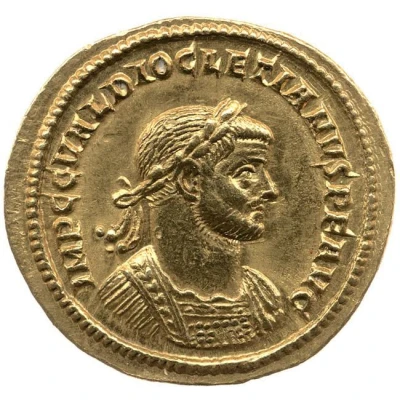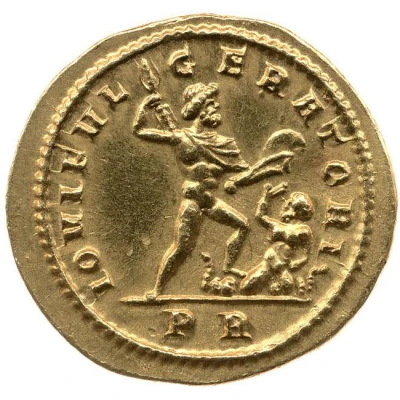


© Trustees of the British Museum
Aureus - Diocletianus IOVI FVLGERATORI; Jupiter
| Gold | 5.4 g | 20.5 mm |
| Issuer | Rome › Roman Empire (27 BC - 395 AD) |
|---|---|
| Emperor | Diocletian (Gaius Aurelius Valerius Diocletianus) (284-305) Maximian Herculius (Marcus Aurelius Valerius Maximianus) (286-305) |
| Type | Standard circulation coin |
| Years | 284-294 |
| Value | Aureus (25⁄2) |
| Currency | Antoninianus, Reform of Caracalla (AD 215 – 301) |
| Composition | Gold |
| Weight | 5.4 g |
| Diameter | 20.5 mm |
| Shape | Round (irregular) |
| Technique | Hammered |
| Demonetized | Yes |
| Updated | 2024-10-05 |
| Numista | N#305822 |
|---|---|
| Rarity index | 100% |
Reverse
Jupiter, running right, holding thunderbolt in right hand and striking down Titan.
Script: Latin
Lettering:
IOVI FVLGERATORI
-/-//PR
Translation:
Iovi Fulgeratori.
Jupiter, the thunderer.
Comment
Mass varies: 5.18–5.73 g;Diameter varies: 19–22 mm;
Example of this type:
Trustees of the British Museum
Source:
Online Coins of the Roman Empire (OCRE)
Interesting fact
One interesting fact about the Aureus - Diocletianus (IOVI FVLGERATORI; Jupiter) coin is that it was issued during a time of significant economic and political change in the Roman Empire. The coin was minted during the reign of Diocletian, who introduced a number of reforms aimed at stabilizing the empire's economy and government. These reforms included the introduction of a new system of taxation, the creation of a centralized bureaucracy, and the establishment of a uniform system of weights and measures. The coin itself is a reflection of these changes, as it features a new design and was minted using a higher standard of gold purity than previous coins. Despite these efforts, the Roman Empire continued to decline, and the coin serves as a reminder of the challenges faced by the empire during this time.